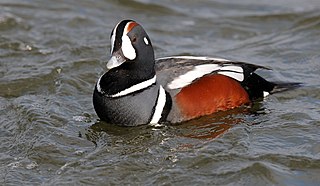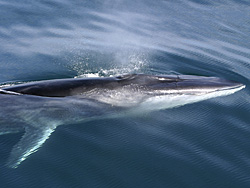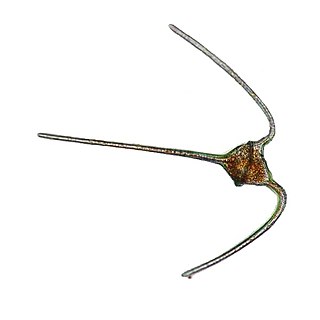Genus is a taxonomic rank used in the biological classification of living and fossil organisms as well as viruses. In the hierarchy of biological classification, genus comes above species and below family. In binomial nomenclature, the genus name forms the first part of the binomial species name for each species within the genus.

The sea ducks (Mergini) are a tribe of the duck subfamily of birds, the Anatinae. The taxonomy of this group is incomplete. Some authorities separate the group as a subfamily, while others remove some genera. Most species within the group spend their winters near coastal waters. Many species have developed specialized salt glands to allow them to tolerate salt water, but these are poorly developed in juveniles. Some of the species prefer riverine habitats. All but two of the 22 species in this group live in far northern latitudes.

Iniidae is a family of river dolphins containing one living genus, Inia, and four extinct genera. The extant genus inhabits the river basins of South America, but the family formerly had a wider presence across the Atlantic Ocean.

Balaenoptera is a genus of rorquals containing eight extant species. Balaenoptera comprises all but two of the extant species in its family ; the genus is currently polyphyletic, with the two aforementioned species being phylogenetically nested within it.

Inia is a genus of river dolphins from South America containing one to four species.
In biology, a monotypic taxon is a taxonomic group (taxon) that contains only one immediately subordinate taxon. A monotypic species is one that does not include subspecies or smaller, infraspecific taxa. In the case of genera, the term "unispecific" or "monospecific" is sometimes preferred. In botanical nomenclature, a monotypic genus is a genus in the special case where a genus and a single species are simultaneously described. In contrast an oligotypic taxon contains more than one but only a very few subordinate taxa.

Lagenorhynchus is a genus of Oceanic dolphins in the infraorder Cetacea, presently containing six extant species. However, there is consistent molecular evidence that the genus is polyphyletic and several of the species are likely to be moved to other genera. In addition, the extinct species Lagenorhynchus harmatuki is also classified in this genus.

Murex is a genus of medium to large sized predatory tropical sea snails. These are carnivorous marine gastropod molluscs in the family Muricidae, commonly called "murexes" or "rock snails".

A salp or salpa is a barrel-shaped, planktic tunicate. It moves by contracting, thereby pumping water through its gelatinous body, one of the most efficient examples of jet propulsion in the animal kingdom. The salp strains the pumped water through its internal feeding filters, feeding on phytoplankton.

The Polyceridae are a taxonomic family of sea slugs, dorid nudibranchs, marine gastropod mollusks within the superfamily Polyceroidea.

Neritidae, common name the nerites, is a taxonomic family of small to medium-sized saltwater and freshwater snails which have a gill and a distinctive operculum.

Carcharias is a genus of sand tiger sharks belonging to the family Odontaspididae. Once bearing many prehistoric species, all have gone extinct with the exception of the critically endangered sand tiger shark.

The genus Ceratium is restricted to a small number of freshwater dinoflagellate species. Previously the genus contained also a large number of marine dinoflagellate species. However, these marine species have now been assigned to a new genus called Tripos. Ceratium dinoflagellates are characterized by their armored plates, two flagella, and horns. They are found worldwide and are of concern due to their blooms.

Odostomia is the most speciose genus of minute sea snails, pyramidellid gastropod mollusks. This genus is placed in the family Pyramidellidae in the subfamily Odostomiinae. There are several hundred species in this diverse genus
Histioneis is a genus of dinoflagellates. According to the World Register of Marine Species, it contains 86 species.
The Platyproteum are a genus of parasitic alveolates in the phylum Apicomplexa. Species in this genus infect marine invertebrates.

The Interim Register of Marine and Nonmarine Genera (IRMNG) is a taxonomic database which attempts to cover published genus names for all domains of life from 1758 in zoology up to the present, arranged in a single, internally consistent taxonomic hierarchy, for the benefit of Biodiversity Informatics initiatives plus general users of biodiversity (taxonomic) information. In addition to containing over 490,000 published genus name instances as at March 2020, the database holds over 1.7 million species names, although this component of the data is not maintained in as current or complete state as the genus-level holdings. IRMNG can be queried online for access to the latest version of the dataset and is also made available as periodic snapshots or data dumps for import/upload into other systems as desired.

Heteropsammia is a genus of apozooxanthellate corals that belong to the family Dendrophylliidae.













